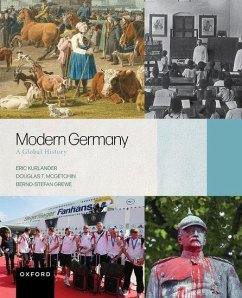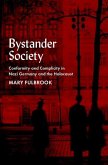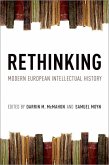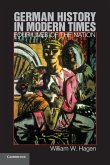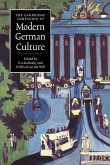Eric Kurlander (Stetson University ), Douglas T. McGetchin (Florida Atlantic University ), Bernd-Stefan Grewe (University of Tubingen )
Modern Germany
A Global History
Eric Kurlander (Stetson University ), Douglas T. McGetchin (Florida Atlantic University ), Bernd-Stefan Grewe (University of Tubingen )
Modern Germany
A Global History
- Broschiertes Buch
Andere Kunden interessierten sich auch für
![Bystander Society Bystander Society]() Mary Fulbrook (Professor of German His Professor of German HistoryBystander Society21,99 €
Mary Fulbrook (Professor of German His Professor of German HistoryBystander Society21,99 €![A History of Twentieth-Century Germany A History of Twentieth-Century Germany]() Ulrich Herbert (Professor of History, Professor of History, UniversA History of Twentieth-Century Germany65,99 €
Ulrich Herbert (Professor of History, Professor of History, UniversA History of Twentieth-Century Germany65,99 €![Rethinking Modern European Intellectual History Rethinking Modern European Intellectual History]() Rethinking Modern European Intellectual History46,99 €
Rethinking Modern European Intellectual History46,99 €![The History of Modern France The History of Modern France]() Jonathan FenbyThe History of Modern France18,99 €
Jonathan FenbyThe History of Modern France18,99 €![German History in Modern Times German History in Modern Times]() William W. HagenGerman History in Modern Times36,99 €
William W. HagenGerman History in Modern Times36,99 €![The Cambridge Companion to Modern German Culture The Cambridge Companion to Modern German Culture]() Eva Kolinsky / Wilfried van der van der Will (eds.)The Cambridge Companion to Modern German Culture39,99 €
Eva Kolinsky / Wilfried van der van der Will (eds.)The Cambridge Companion to Modern German Culture39,99 €![1864: The Forgotten War That Shaped Modern Europe 1864: The Forgotten War That Shaped Modern Europe]() Tom Buk-Swienty1864: The Forgotten War That Shaped Modern Europe20,99 €
Tom Buk-Swienty1864: The Forgotten War That Shaped Modern Europe20,99 €-
-
-
Produktdetails
- Verlag: Oxford University Press Inc
- Seitenzahl: 928
- Erscheinungstermin: 1. März 2023
- Englisch
- Abmessung: 235mm x 190mm x 43mm
- Gewicht: 1592g
- ISBN-13: 9780190641528
- ISBN-10: 0190641525
- Artikelnr.: 66266578
Hinweis: Dieser Artikel kann nur an eine deutsche Lieferadresse ausgeliefert werden.
- Herstellerkennzeichnung
- Libri GmbH
- Europaallee 1
- 36244 Bad Hersfeld
- gpsr@libri.de
Dr. Eric Kurlander, William R. Kenan Jr. Professor of History, Stetson University Doug McGetchin, Associate Professor of History, Florida Atlantic University. Bernd-Stefan Grewe, Professor of History, Director of the Institute of Didactics of History and Public History, University of Tübingen, Germany.
* List of Maps
* Preface
* Acknowledgements
* About the Authors
* Chapter One: A World in Flux: 1500-1648
* The Politics of Empire
* Charles V and Universal Monarchy
* Culture and Society in the Age of Exploration
* The Reformation
* The Social and Political Consequences of the Reformation
* Conclusion
* Chapter Two: Germans in the Age of Absolutism, 1648-1740
* Dynastic Politics, Trade, and Imperial Exchange
* Society, Popular Culture, and Belief
* Conclusion
* Chapter Three: German Empires and Enlightenments, 1740-1790
* Poets, Philosophers, and World Citizens
* Reforming State and Society
* War and Empire
* Conclusion
* Chapter Four: Revolution and Reform, 1789-1815
* The French Revolution in Germany
* The Impact of the Revolution on German States and Peoples, 1803-1815
* The End of the Holy Roman Empire and the Emerging German Nation,
1803-1815
* Conclusion
* Chapter Five: Between Reaction and Revolution, 1815-1848
* Society and Economy
* Culture and Politics in the Vormärz
* The Revolutions of 1848
* Conclusion
* Chapter Six: Toward Germany, 1848-1871
* Industry and Society
* German Culture Beyond Borders
* The Politics of Nationhood
* Conclusion
* Chapter Seven: Building Empire at Home and Abroad, 1871-1890
* Building Democracy
* Nation-Building and its Discontents
* Building Empire
* Conclusion
* Chapter Eight: Wilhelmine Germany and "World Policy," 1890-1914
* Democracy and Empire
* Progress and Anxiety: Economy, Society and Culture
* Empire and Colonial Policy
* Conclusion
* Chapter Nine: The First World War, 1914-1918
* The Origins and Course of the First World War
* Total War
* Wartime Politics and Revolution
* Conclusion
* Chapter Ten: The Weimar Republic, 1918-1933
* The Challenges of Democracy: Domestic Politics and Socioeconomic
Crisis
* The Challenges of Modernity: Culture and Society in the Weimar
Republic
* National Conflict and International Compromise, 1919-1933
* Conclusion
* Chapter Eleven: The Third Reich, 1933-1945
* Nazi Politics in a Global Context
* Society and Economy: A National Socialist Revolution?
* The Culture of Coercion and Consent 1933-1939
* Conclusion
* Chapter Twelve: The Second World War, 1939-1945
* Strange Victories, 1938-1941
* Nazi Empire Building, 1941-1943
* Collapse and End of the Second World War, 1943-1945
* Conclusion
* Chapter Thirteen: The Holocaust and Ethnic Cleansing, 1941-1945
* Global Contexts: European Colonialism, Ethnic Cleansing, and
Antisemitism, 1918-1938
* From "Jewish Question" to "Final Solution," 1933-1942
* Conclusion
* Chapter Fourteen: German Republics, 1945-1969
* Germans and the New Postwar Order, 1945-1949
* Culture, Economy, and Society in Two Germanies, 1949-1969
* Cold War Politics and Diplomacy, 1949-1969
* Conclusion
* Chapter Fifteen: Transcending Divisions, 1969-1991
* Politic and Diplomacy (Ostpolitik, Détente, and Disillusion)
* Economy, Culture, and Society in Two Germanies, 1969-1989
* The Fall of the Wall and Reunification Summer 1989-Summer 1991
* Conclusion
* Chapter Sixteen: Germany and the World, 1991-Present
* Multicultural Germany
* Politics and Economy
* Germany in the World
* Conclusion
* Glossary
* Credits
* Index
* Preface
* Acknowledgements
* About the Authors
* Chapter One: A World in Flux: 1500-1648
* The Politics of Empire
* Charles V and Universal Monarchy
* Culture and Society in the Age of Exploration
* The Reformation
* The Social and Political Consequences of the Reformation
* Conclusion
* Chapter Two: Germans in the Age of Absolutism, 1648-1740
* Dynastic Politics, Trade, and Imperial Exchange
* Society, Popular Culture, and Belief
* Conclusion
* Chapter Three: German Empires and Enlightenments, 1740-1790
* Poets, Philosophers, and World Citizens
* Reforming State and Society
* War and Empire
* Conclusion
* Chapter Four: Revolution and Reform, 1789-1815
* The French Revolution in Germany
* The Impact of the Revolution on German States and Peoples, 1803-1815
* The End of the Holy Roman Empire and the Emerging German Nation,
1803-1815
* Conclusion
* Chapter Five: Between Reaction and Revolution, 1815-1848
* Society and Economy
* Culture and Politics in the Vormärz
* The Revolutions of 1848
* Conclusion
* Chapter Six: Toward Germany, 1848-1871
* Industry and Society
* German Culture Beyond Borders
* The Politics of Nationhood
* Conclusion
* Chapter Seven: Building Empire at Home and Abroad, 1871-1890
* Building Democracy
* Nation-Building and its Discontents
* Building Empire
* Conclusion
* Chapter Eight: Wilhelmine Germany and "World Policy," 1890-1914
* Democracy and Empire
* Progress and Anxiety: Economy, Society and Culture
* Empire and Colonial Policy
* Conclusion
* Chapter Nine: The First World War, 1914-1918
* The Origins and Course of the First World War
* Total War
* Wartime Politics and Revolution
* Conclusion
* Chapter Ten: The Weimar Republic, 1918-1933
* The Challenges of Democracy: Domestic Politics and Socioeconomic
Crisis
* The Challenges of Modernity: Culture and Society in the Weimar
Republic
* National Conflict and International Compromise, 1919-1933
* Conclusion
* Chapter Eleven: The Third Reich, 1933-1945
* Nazi Politics in a Global Context
* Society and Economy: A National Socialist Revolution?
* The Culture of Coercion and Consent 1933-1939
* Conclusion
* Chapter Twelve: The Second World War, 1939-1945
* Strange Victories, 1938-1941
* Nazi Empire Building, 1941-1943
* Collapse and End of the Second World War, 1943-1945
* Conclusion
* Chapter Thirteen: The Holocaust and Ethnic Cleansing, 1941-1945
* Global Contexts: European Colonialism, Ethnic Cleansing, and
Antisemitism, 1918-1938
* From "Jewish Question" to "Final Solution," 1933-1942
* Conclusion
* Chapter Fourteen: German Republics, 1945-1969
* Germans and the New Postwar Order, 1945-1949
* Culture, Economy, and Society in Two Germanies, 1949-1969
* Cold War Politics and Diplomacy, 1949-1969
* Conclusion
* Chapter Fifteen: Transcending Divisions, 1969-1991
* Politic and Diplomacy (Ostpolitik, Détente, and Disillusion)
* Economy, Culture, and Society in Two Germanies, 1969-1989
* The Fall of the Wall and Reunification Summer 1989-Summer 1991
* Conclusion
* Chapter Sixteen: Germany and the World, 1991-Present
* Multicultural Germany
* Politics and Economy
* Germany in the World
* Conclusion
* Glossary
* Credits
* Index
* List of Maps
* Preface
* Acknowledgements
* About the Authors
* Chapter One: A World in Flux: 1500-1648
* The Politics of Empire
* Charles V and Universal Monarchy
* Culture and Society in the Age of Exploration
* The Reformation
* The Social and Political Consequences of the Reformation
* Conclusion
* Chapter Two: Germans in the Age of Absolutism, 1648-1740
* Dynastic Politics, Trade, and Imperial Exchange
* Society, Popular Culture, and Belief
* Conclusion
* Chapter Three: German Empires and Enlightenments, 1740-1790
* Poets, Philosophers, and World Citizens
* Reforming State and Society
* War and Empire
* Conclusion
* Chapter Four: Revolution and Reform, 1789-1815
* The French Revolution in Germany
* The Impact of the Revolution on German States and Peoples, 1803-1815
* The End of the Holy Roman Empire and the Emerging German Nation,
1803-1815
* Conclusion
* Chapter Five: Between Reaction and Revolution, 1815-1848
* Society and Economy
* Culture and Politics in the Vormärz
* The Revolutions of 1848
* Conclusion
* Chapter Six: Toward Germany, 1848-1871
* Industry and Society
* German Culture Beyond Borders
* The Politics of Nationhood
* Conclusion
* Chapter Seven: Building Empire at Home and Abroad, 1871-1890
* Building Democracy
* Nation-Building and its Discontents
* Building Empire
* Conclusion
* Chapter Eight: Wilhelmine Germany and "World Policy," 1890-1914
* Democracy and Empire
* Progress and Anxiety: Economy, Society and Culture
* Empire and Colonial Policy
* Conclusion
* Chapter Nine: The First World War, 1914-1918
* The Origins and Course of the First World War
* Total War
* Wartime Politics and Revolution
* Conclusion
* Chapter Ten: The Weimar Republic, 1918-1933
* The Challenges of Democracy: Domestic Politics and Socioeconomic
Crisis
* The Challenges of Modernity: Culture and Society in the Weimar
Republic
* National Conflict and International Compromise, 1919-1933
* Conclusion
* Chapter Eleven: The Third Reich, 1933-1945
* Nazi Politics in a Global Context
* Society and Economy: A National Socialist Revolution?
* The Culture of Coercion and Consent 1933-1939
* Conclusion
* Chapter Twelve: The Second World War, 1939-1945
* Strange Victories, 1938-1941
* Nazi Empire Building, 1941-1943
* Collapse and End of the Second World War, 1943-1945
* Conclusion
* Chapter Thirteen: The Holocaust and Ethnic Cleansing, 1941-1945
* Global Contexts: European Colonialism, Ethnic Cleansing, and
Antisemitism, 1918-1938
* From "Jewish Question" to "Final Solution," 1933-1942
* Conclusion
* Chapter Fourteen: German Republics, 1945-1969
* Germans and the New Postwar Order, 1945-1949
* Culture, Economy, and Society in Two Germanies, 1949-1969
* Cold War Politics and Diplomacy, 1949-1969
* Conclusion
* Chapter Fifteen: Transcending Divisions, 1969-1991
* Politic and Diplomacy (Ostpolitik, Détente, and Disillusion)
* Economy, Culture, and Society in Two Germanies, 1969-1989
* The Fall of the Wall and Reunification Summer 1989-Summer 1991
* Conclusion
* Chapter Sixteen: Germany and the World, 1991-Present
* Multicultural Germany
* Politics and Economy
* Germany in the World
* Conclusion
* Glossary
* Credits
* Index
* Preface
* Acknowledgements
* About the Authors
* Chapter One: A World in Flux: 1500-1648
* The Politics of Empire
* Charles V and Universal Monarchy
* Culture and Society in the Age of Exploration
* The Reformation
* The Social and Political Consequences of the Reformation
* Conclusion
* Chapter Two: Germans in the Age of Absolutism, 1648-1740
* Dynastic Politics, Trade, and Imperial Exchange
* Society, Popular Culture, and Belief
* Conclusion
* Chapter Three: German Empires and Enlightenments, 1740-1790
* Poets, Philosophers, and World Citizens
* Reforming State and Society
* War and Empire
* Conclusion
* Chapter Four: Revolution and Reform, 1789-1815
* The French Revolution in Germany
* The Impact of the Revolution on German States and Peoples, 1803-1815
* The End of the Holy Roman Empire and the Emerging German Nation,
1803-1815
* Conclusion
* Chapter Five: Between Reaction and Revolution, 1815-1848
* Society and Economy
* Culture and Politics in the Vormärz
* The Revolutions of 1848
* Conclusion
* Chapter Six: Toward Germany, 1848-1871
* Industry and Society
* German Culture Beyond Borders
* The Politics of Nationhood
* Conclusion
* Chapter Seven: Building Empire at Home and Abroad, 1871-1890
* Building Democracy
* Nation-Building and its Discontents
* Building Empire
* Conclusion
* Chapter Eight: Wilhelmine Germany and "World Policy," 1890-1914
* Democracy and Empire
* Progress and Anxiety: Economy, Society and Culture
* Empire and Colonial Policy
* Conclusion
* Chapter Nine: The First World War, 1914-1918
* The Origins and Course of the First World War
* Total War
* Wartime Politics and Revolution
* Conclusion
* Chapter Ten: The Weimar Republic, 1918-1933
* The Challenges of Democracy: Domestic Politics and Socioeconomic
Crisis
* The Challenges of Modernity: Culture and Society in the Weimar
Republic
* National Conflict and International Compromise, 1919-1933
* Conclusion
* Chapter Eleven: The Third Reich, 1933-1945
* Nazi Politics in a Global Context
* Society and Economy: A National Socialist Revolution?
* The Culture of Coercion and Consent 1933-1939
* Conclusion
* Chapter Twelve: The Second World War, 1939-1945
* Strange Victories, 1938-1941
* Nazi Empire Building, 1941-1943
* Collapse and End of the Second World War, 1943-1945
* Conclusion
* Chapter Thirteen: The Holocaust and Ethnic Cleansing, 1941-1945
* Global Contexts: European Colonialism, Ethnic Cleansing, and
Antisemitism, 1918-1938
* From "Jewish Question" to "Final Solution," 1933-1942
* Conclusion
* Chapter Fourteen: German Republics, 1945-1969
* Germans and the New Postwar Order, 1945-1949
* Culture, Economy, and Society in Two Germanies, 1949-1969
* Cold War Politics and Diplomacy, 1949-1969
* Conclusion
* Chapter Fifteen: Transcending Divisions, 1969-1991
* Politic and Diplomacy (Ostpolitik, Détente, and Disillusion)
* Economy, Culture, and Society in Two Germanies, 1969-1989
* The Fall of the Wall and Reunification Summer 1989-Summer 1991
* Conclusion
* Chapter Sixteen: Germany and the World, 1991-Present
* Multicultural Germany
* Politics and Economy
* Germany in the World
* Conclusion
* Glossary
* Credits
* Index

